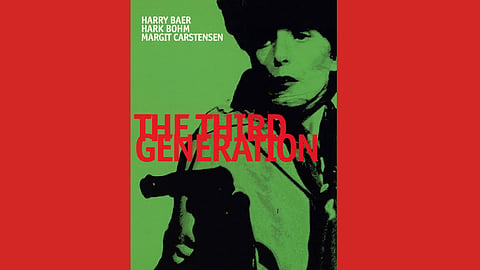‘Potentially Ill-Advised: Films About Assassinating Your Political Leaders’ Brings Fiery, Revolutionary Range to The Beacon Cinema
Never in recent memory has it been so in vogue to publicly despise the ruling class. From the American government's bankrolling of the genocide in Gaza, to mainstream resonance with alleged CEO-assassin Luigi Mangione, to widespread anger over California's mismanagement of resources (including the use of juvenile prison labor) to fight the fires currently ravaging Los Angeles, the blatant crimes of the U.S.'s imperialist oligarchy have emerged to the forefront of public consciousness. Even as we live in a culture of billionaire worship and aspirations of excess, many are realizing late-stage capitalism is only beneficial for CEOs, politicians, and their ilk, while the rest of us are slated to become casualties to their greed.
Keeping up with the zeitgeist, The Beacon Cinema in Columbia City kicked off the new year with Potentially Ill-Advised: Films About Assassinating Your Political Leaders. Running from now through Jan. 25, the film series delivers an internationalist education — one that both spans decades and runs the gamut of genres — on the perks, perils, and pitfalls of meeting oppressive political institutions with the same kind of fatal violence they inflict on the masses to sustain and perpetuate their wealth and power.
The series imagines what happens when dissatisfaction amongst the global 99% reaches a fever pitch. Its web page lists incisive quotes from the likes of Voltaire, such as "The best government is a benevolent tyranny tempered by an occasional assassination."
Potentially Ill-Advised features seven films that will each enjoy two showings throughout the run: Love and Anarchy (1973), Escape from New York (1981), Hero (2003), a mystery surprise film, The Edge (1968), and Revolution +1 (2022), opening with Rainer Werner Fassbinder's 1979 black comedy, The Third Generation (German: Die Dritte Generation). Ostensibly about a band of ragtag leftists who plot to kidnap an industrialist, the film presents plenty of social criticism that transcends the historical context of the Western bloc for the viewer to chew on once the credits roll.
Fassbinder was a queer dramatist and child of the post-World War II period in West Germany, and he imbued his films with sociopolitical events that defined his time, like the aftermath of Nazism. The Red Army Faction — a far-left militant group that was held responsible for the murder of industrialist, aggressive anti-communist, and Nazi SS-Officer Hanns Martin Schleyer, among others — clearly influenced The Third Generation.
The first hour of The Third Generation is slower on the pulpy, ridiculous action scenes that define its last 35 minutes, but has no shortage of thought-provoking dialogue, dark humor, and biting criticism. Fassbinder's tableau of characters are themselves pregnant with scathing indictments of the leftist middle class, from the haughty ringleader who denigrates drug users, to the overeducated son of an aristocrat who is initially excluded but eventually uncovers the corrupt plot, to the feminist history professor who begins a relationship with her rapist and disparages one of her students who questions the values of contemporary leftists:
"First they [the left] want a revolution … then they get scared when their middle-class values are in jeopardy," and "Children of the bourgeoisie often inherit the attitudes, advantages, and egotistical instincts of their forebears."
As it becomes clear there is a mole amongst them and the band of would-be terrorists grows more paranoid and disorganized, the plot quickens and becomes a little convoluted — perhaps intentional on Fassbinder's part; the film is absurdist, after all. Even so, one cannot help but admire Fassbinder's clever cinematic touches, like how he contextualizes the film with bathroom graffiti messages pasted on screen throughout, giving viewers insight into the most private, radical political thoughts of West Germans of the time. The film's 1979 release did not inspire positive mainstream feedback, and even incited property damage and physical violence at screenings in Hamburg and Frankfurt, further legitimizing its claims of continued post-war fascism in the actions of ordinary citizens.
Provocative and brash in its social commentary, and with an ending that manages to both come full circle and leave the audience wondering what the heck just happened ("The youth have energy, noble aspirations, and an instinct for justice"), The Third Generation demands viewers critically and carefully engage with its layers, and contemplate their own racism, sexism, allegiance to law and order, and reflect on their class consciousness (or lack thereof).
It also works as an introduction to Fassbinder's impressive repertoire of films. During his relatively short career, which lasted about 15 years before his death in 1982, he wrote, directed, and released more than 40 films. Today, Fassbinder is widely celebrated as a principal creator of the New German Cinema Movement. His visionary ideas still resonate with and provide a critical pathway to liberatory politics for international audiences. It follows that the remaining films in the Potentially Ill-Advised program present similar but contextually different incendiary perspectives on what it means to really fight back in favor of something new.
Be sure to catch the next films in the Potentially Ill-Advised program at The Beacon, which runs through Jan. 25.
The Emerald's arts coverage is supported in part with funding from 4 Culture and the City of Seattle's Office of Arts & Culture. The Emerald maintains editorial control over its coverage.
Help keep BIPOC-led, community-powered journalism free — become a Rainmaker today.




